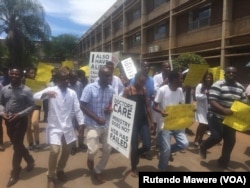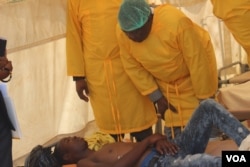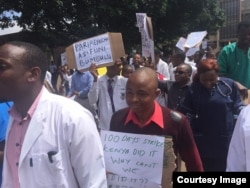Striking Zimbabwean doctors, who have been on strike for more than a month, demanding payment of salaries in United States dollars and other issues, say they won’t return to work as the government is still unable to meet their grievances.
In a statement Tuesday, members of the Zimbabwe Hospital Doctors’ Association (ZHDA) said they resolved to continue with their industrial action following a meeting on Monday with Health Permanent Secretary Retired Brigadier General Dr. Gerald Gwinji and representatives of the Health Service Board (HSB), Ministry of Finance and ZHDA.
The meeting was the first in weeks following a declaration by the Labor Court that the doctors’ strike was illegal and moves by Vice President Constantino Chiwenga to punish the striking medical workers and the downgrading of junior doctors’ posts to that of student interns.
“Moving forward we are still hoping for the employer to come back with a genuine solution to the grievances. The current stalemate makes it difficult for doctors to return to work or let alone for the fresh graduates to assume duty. It is our hope that the spirit of negotiation so far rekindled will give birth to tangible solutions and resolve the impasse in the shortest possible time from today.”
The striking doctors said the government refused to pay them in United States dollars due to acute shortages of foreign currency.
“The current salary of doctors has been devalued by nearly 4 times due to the fact that the RTGS form in which it’s paid has lost value on the market and most commodities are now being charged in USDs whether officially or unofficially. As doctors, we signed a Collective Bargaining Agreement with the employer earlier this year in which the employer legally agreed to pay the health care workers in USDs and that any other arrangement would be a violation of the agreement.
“In the meeting, the employer however indicated that currently they are not in a position to pay the health workers in USDs. We reminded them of the agreement but the answer remained the same. Doctors even tried to negotiate with the employer on possible alternatives including an arrangement for a percentage of the salaries to be paid in USDs but to no avail.”
The ZHDA noted that the government also refused to adjust the RTGS salaries of the health care workers. “As doctors, we are also requesting that the employer adjust the on call allowance to 10 USDs per hour as they had promised to do ... The employer indicated that they are currently not in a position to do that and will only consider it in April 2019. The deadlock in these matters is because the employer is not forthcoming in discussing and negotiating for immediate alternatives with its workers.”
The Zimbabwe Hospital Doctors’ Association said they further rejected a vehicle car loan scheme that did not tackle challenges faced by its members.
“The importance of vehicles for doctors is priceless due to the emergency requirements of the line of work and the need to be on time to save lives. The government indicated that they are availing the remaining 6 million RTGS for vehicle loan assistance to health workers. This would be coupled with a duty free facility to the beneficiaries.
“The loan amount is 10,000 RTGS per beneficiary. Firstly, way less than a quarter of doctors will benefit from the loans because the funding is shared across all health care workers. Secondly, the amount of loan given can no longer compete with the on-going market prices for cars.”
The ZHDA said the proposed revitalized scheme is unsustainable.
“For so many years now, we have implored the government to provide the long term solution of a duty free facility which would be available to all doctors and not directed to a few beneficiaries. We have since indicated that the current loan scheme is not a long term solution and has lost value. The employer was however not at liberty to offer anything other than the foresaid arrangement.”
On medical supplies, the ZHDA said it was puzzling that the government continued talking about the availability of large stocks of drugs and other medical accessories while hospitals are still running without the necessary materials.
“The Ministry aired its position that they had secured $2.2 million worth of drugs at NatPharm and was in the process of redistributing them. We encouraged them not to continue discussing stocks at NatPharm but to do the most important step of making sure the drugs are available in our hospitals since the discussion about drugs being at NatPharm was clearly not changing the real situation on the ground and had only caused more wonder than anticipation.
“However, as a way forward we implored the government to provide short and long term evaluable targets and time lines so as to maintain consistency in the supply. This is what we have frequently asked our employer to do for the past 4 weeks as one of the steps to resolve the current impasse with doctors but, to date it has been met with resistance for reasons best known to them. Our hope is for long term sustainable solutions to our health care system not temporary measures.”
The striking doctors are also worried about the doctor to patient ratio, which they say is way below par.
“… The number of trained specialists is still incomparable to regional targets. We have since indicated to our ministry to provide GMO (general medical officers) and training posts for doctors so that this situation can be addressed. As a nation, we can’t continue with a situation whereby most doctors continue going outside due to the unavailability of government posts. This in our opinion should not be a condition the ministry has to even ponder about, if the need to address the nation’s health care system is paramount.
“The ministry indicated that they had provided 402 posts across all health care workers. No specificity to which of those posts belonged to doctors and no mention of specialist training posts. We beseeched our employer to be more serious with this issue and provide the important information which is so much required.”
They chided government for drafting new contracts for incoming junior doctors.
“In the recent turn of events, our employer has tried to rush in about 200 newly-finished doctors to cover the gap of 530 whom they have suspended. Additionally, they have also tried to push for the junior doctors to be employed under a new contract which would make sure that there is suppression of the doctors’ rights to expression of concerns and that they will be mere student spectators in the system.
“The move has been met with resistance by doctors nationwide as it merely heralded the beginning of workers oppression in the system. It is an apparent attempt to allow some individuals in the Ministry to sleep on their jobs whilst the health care system of the nation burns to the ground. Firstly, the incoming doctors have resisted the attempted move to use them to cover up the genuine grievances that the ministry has been boy courting to address. They stand in solidarity with all the doctors nationwide. Secondly, as doctors we are not going to subscribe to the new contract and we are going to stand our ground to stop such unfair practices in the system and we have since communicated that to the employer.”
There was no comment from HSB, the Ministry of Health and office of Vice President Chiwenga.
The government suspended the striking 500 junior and middle level doctors, indicating that they broke the law.









